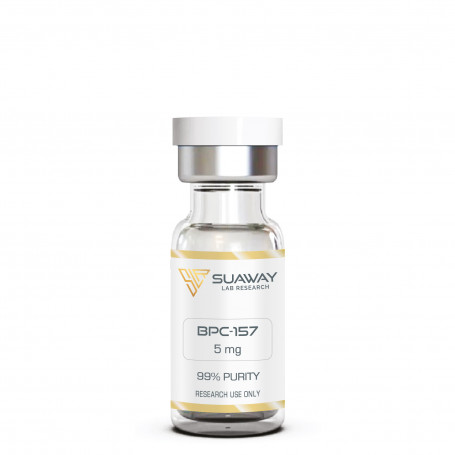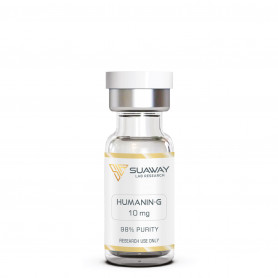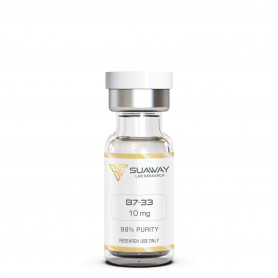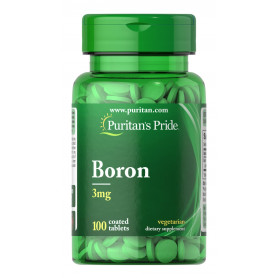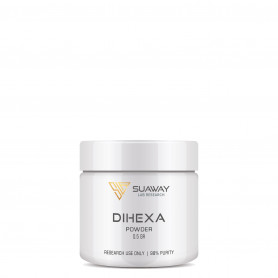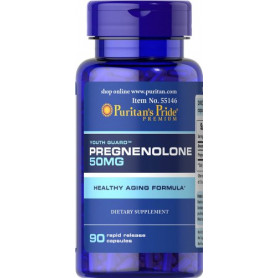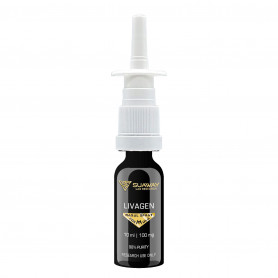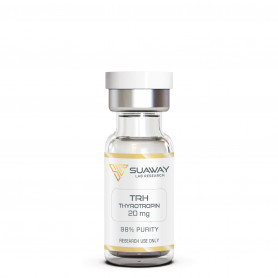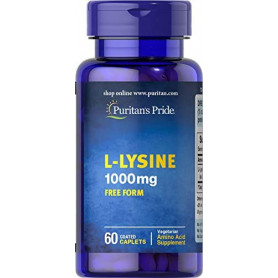BPC-157 - 5mg
BPC-157 is a penta-decapeptide comprised of 15 amino acids. It has been demonstrated in experiments conducted on animals to hasten the recovery process of a wide variety of wounds, including those affecting the muscle, tendons, and ligaments. In addition to this, it has been shown that BPC-157 helps prevent gastrointestinal ulcers and protects organs from damage. BPC-57 treats leaky gut, irritable bowel syndrome (IBS), gastrointestinal cramps, and Crohn's disease by exerting a systemic effect on the digestive tract. It has been shown that this particular peptide has analgesic properties. Recent studies have shown that it may hasten the healing process of burns on the skin by enhancing blood flow to the areas that have been injured. BPC-157 is a candidate for use as a therapeutic tool in the treatment of wound healing since it considerably accelerates the synthesis of reticulin and collagen, as well as angiogenesis, and it stimulates the infiltration of macrophages and fibroblasts. BPC-157 has been shown to have effects on:
- Fast recovery from muscle tears
- Wound healing
- Ligament healing
- Healing and prevention of gastric ulcers and inflammatory bowel diseases
- Blood vessel growth
- The coagulation cascade
- Nitric oxide generation
- Immune system function
- Gene expression Hormone regulation
Description
STRUCTURE
Sequence: Gly-Glu-Pro-Pro-Pro-Gly- Lys-Pro-Ala-Asp-Asp-Ala-Gly-Leu-Val
Molecular Formula: C62H98N16O22
Molecular Weight: 1419.556 g/mol
CAS: 137525-51-0
Peptide Purity: greater than 98%
Other details: No TFA Salt, No Mannitol
Storage: Lyophilized peptide must be stored at -20°C and peptide solution at +4°C
BPC-157 has low oral and excellent subcutaneous bioavailability.
DESCRITPION
The natural function of BPC-157 in the gastrointestinal tract is to preserve the integrity of the mucosal barrier. This barrier protects the underlying tissues from the potentially damaging effects of gastric acid, bile, or other compounds that are required for digestion and the absorption of nutrients from food. BPC-157 is produced naturally in the GI tract. The recruitment of fibroblasts is necessary for the performance of at least a portion of this function. Because of the dose-dependent impact that BPC-157 has on the spread of fibroblasts in culture and in vivo, the cells are accelerated in their ability to both proliferate and migrate. Fibroblasts are essential to the process of wound healing since they are the cells that are responsible for the deposition of extracellular matrix proteins such as collagen, fibrin, elastin, and others.
BPC-157 is a powerful angiogenic factor that speeds up the rate of proliferation and growth of endothelial cells, which are the cells that line blood arteries. The pace at which collateral blood vessels form in response to ischemia is shown to be significantly accelerated by the peptide, according to research conducted on rats. Even though this effect has been seen most frequently in the gastrointestinal tract, there is evidence that it also benefits the cardiovascular system, the nervous system, and the muscles. This leads researchers to believe that BPC-157 could be used not only as a treatment for conditions such as stroke and heart attack but also as a probative peptide in research aimed at determining how to best promote healing after ischemic injury.
It should not come as a surprise that BPC-157 has demonstrated good results in animal models of the tendon, ligament, bone, as well as other connective tissue injuries. Given its functions in fibroblast recruitment and blood vessel formation, this discovery should not come as a surprise. Injuries to tendons and ligaments take a long time to heal in large part because these tissues do not get an adequate amount of blood flow. The pace at which fibroblasts and other cells that aid in wound healing can travel to the site of the damage is slowed down by an inadequate blood supply, which, as a result, reduces the total amount of repair that can take place. In the context of the tendon, ligament, and bone damage, research conducted in vitro as well as in vivo on rat tendons has shown that BPC-157 stimulates the formation of collateral connections and increases the density of fibroblasts. According to the findings of this study, the hormone BPC-157 promotes healing in these tissues at a rate that is superior to that achieved by bFGF, EFG, and VGF.
According to studies conducted on rats, BPC-157 can reduce the levels of oxidative stress indicators such as nitric oxide and malondialdehyde (MDA). Because of this, BPC-157 is a potent antioxidant. This quality of the peptide is reinforced even further by studies demonstrating that it may inhibit the generation of reactive oxygen species in the gastrointestinal system.
It has been discovered that BPC-157 may mitigate the negative effects of some medicines, including nonsteroidal anti-inflammatory drugs (NSAIDs), pharmaceuticals used to treat mental health disorders, and a variety of cardiac treatments.
REFERENCES
M. Hsieh et al., "Therapeutic potential of pro-angiogenic BPC157 is associated with VEGFR2 activation and up-regulation" [Journal of Molecular Medicine]
J. Vukojevic et al., "Rat inferior caval vein (ICV) ligature and particular new insights with the stable gastric pentadecapeptide BPC 157" [Vascular Pharmacology]
N. Jelovac et al., "Pentadecapeptide BPC 157 attenuates disturbances induced by neuroleptics: the effect on catalepsy and gastric ulcers in mice and rats" [PubMed]
D. Strinic et al., "BPC 157 counteracts QTc prolongation induced by haloperidol, fluphenazine, clozapine, olanzapine, quetiapine, sulpiride, and metoclopramide in rats" [PubMed]
K. Skrlec et al., "Engineering recombinant Lactococcus lactis as a delivery vehicle for BPC-157 peptide with antioxidant activities" [PubMed]
C. Chang et al., "The promoting effect of pentadecapeptide BPC 157 on tendon healing involves tendon outgrowth, cell survival, and cell migration" [PubMed]
S. Seiwerth et al., "BPC 157 and Standard Angiogenic Growth Factors. Gastrointestinal Tract Healing, Lessons from Tendon, Ligament, Muscle and Bone Healing" [PubMed]
P. Sikiric et al., "Novel Cytoprotective Mediator, Stable Gastric Pentadecapeptide BPC 157. Vascular Recruitment and Gastrointestinal Tract Healing" [PubMed]
DISCLAIMER
This product is intendend for lab research and development use only. These studies are performed outside of the body. This product is not medicines or drugs and has not been approved by the FDA or EMA to prevent, treat or cure any medical condition, ailment or disease. Bodily introduction of any kind into humans or animals is strictly forbidden by law. This product should only be handled by licensed, qualified professionals.
All product information provided on this website is for informational and educational purposes only.

